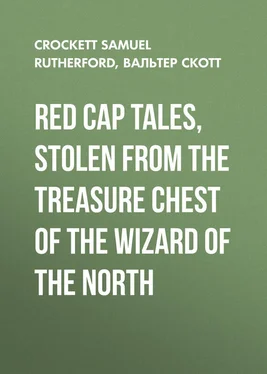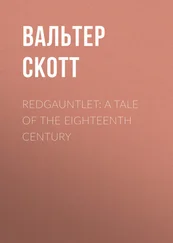Вальтер Скотт - Red Cap Tales, Stolen from the Treasure Chest of the Wizard of the North
Здесь есть возможность читать онлайн «Вальтер Скотт - Red Cap Tales, Stolen from the Treasure Chest of the Wizard of the North» — ознакомительный отрывок электронной книги совершенно бесплатно, а после прочтения отрывка купить полную версию. В некоторых случаях можно слушать аудио, скачать через торрент в формате fb2 и присутствует краткое содержание. Жанр: foreign_prose, foreign_antique, на английском языке. Описание произведения, (предисловие) а так же отзывы посетителей доступны на портале библиотеки ЛибКат.
- Название:Red Cap Tales, Stolen from the Treasure Chest of the Wizard of the North
- Автор:
- Жанр:
- Год:неизвестен
- ISBN:нет данных
- Рейтинг книги:4 / 5. Голосов: 1
-
Избранное:Добавить в избранное
- Отзывы:
-
Ваша оценка:
- 80
- 1
- 2
- 3
- 4
- 5
Red Cap Tales, Stolen from the Treasure Chest of the Wizard of the North: краткое содержание, описание и аннотация
Предлагаем к чтению аннотацию, описание, краткое содержание или предисловие (зависит от того, что написал сам автор книги «Red Cap Tales, Stolen from the Treasure Chest of the Wizard of the North»). Если вы не нашли необходимую информацию о книге — напишите в комментариях, мы постараемся отыскать её.
Red Cap Tales, Stolen from the Treasure Chest of the Wizard of the North — читать онлайн ознакомительный отрывок
Ниже представлен текст книги, разбитый по страницам. Система сохранения места последней прочитанной страницы, позволяет с удобством читать онлайн бесплатно книгу «Red Cap Tales, Stolen from the Treasure Chest of the Wizard of the North», без необходимости каждый раз заново искать на чём Вы остановились. Поставьте закладку, и сможете в любой момент перейти на страницу, на которой закончили чтение.
Интервал:
Закладка:
"Perhaps some of the company may have thought it was not a man at all, but some prisoned fairy tied to an endless task—Wizard Michael's familiar spirit, or Lord Soulis's imp Red Cap doing his master's bidding with a goose-quill.
"But it was something much more wonderful than any of these. It was the hand of Walter Scott finishing Waverley , at the rate of a volume every ten days!"
"Why did he work so hard?" demanded Hugh John, whom the appearance of fifty hands diligently writing would not have annoyed—no, not if they had all worked like sewing-machines.
"Because," I answered, "the man who wrote Waverley was beginning to have more need of money. He had bought land. He was involved in other people's misfortunes. Besides, for a long time, he had been a great poet, and now of late there had arisen a greater."
"I know," cried Sweetheart, "Lord Byron—but I don't think he was."
"Anyway Fitzjames and Roderick Dhu is ripping!" announced Hugh John, and, rising to his feet, he whistled shrill in imitation of the outlaw. It was the time to take the affairs of children at the fulness of the tide.
"I think," I ventured, "that you would like the story of Waverley if I were to tell it now. I know you will like Rob Roy . Which shall it be first?"
Then there were counter-cries of "Waverley" and "Rob Roy"—all the fury of a contested election. But Sweetheart, waiting till the brawlers were somewhat breathed, indicated the final sense of the meeting by saying quietly, " Tell us the one the hand was writing! "
RED CAP TALES TOLD FROM WAVERLEY
THE FIRST TALE FROM "WAVERLEY" 1 1 These were Scottish children to whom the stories were retold, and they understood the Scottish tongue. So the dialect parts were originally told in that speech. Now, however, in pity for children who have the misfortune to inherit only English, I have translated all the hard words and phrases as best I could. But the old is infinitely better, and my only hope and aim is, that the retelling of these stories by the living voice may send every reader, every listener, to the Master of Romance himself. If I succeed in this, my tale-telling shall not have been in vain.
I. GOOD-BYE TO WAVERLEY-HONOUR
On a certain Sunday evening, toward the middle of the eighteenth century, a young man stood practising the guards of the broadsword in the library of an old English manor-house. The young man was Captain Edward Waverley, recently assigned to the command of a company in Gardiner's regiment of dragoons, and his uncle was coming in to say a few words to him before he set out to join the colours.
Being a soldier and a hero, Edward Waverley was naturally tall and handsome, but, owing to the manner of his education, his uncle, an high Jacobite of the old school, held that he was "somewhat too bookish" for a proper man. He must therefore see a little of the world, asserted old Sir Everard.
His Aunt Rachel had another reason for wishing him to leave Waverley-Honour. She had actually observed her Edward look too often across at the Squire's pew in church! Now Aunt Rachel held it no wrong to look at Squire Stubbs's pew if only that pew had been empty. But it was (oh, wickedness!) just when it contained the dear old-fashioned sprigged gown and the fresh pretty face of Miss Cecilia Stubbs, that Aunt Rachel's nephew looked most often in that direction. In addition to which the old lady was sure she had observed "that little Celie Stubbs" glance over at her handsome Edward in a way that—well, when she was young! And here the old lady bridled and tossed her head, and the words which her lips formed themselves to utter (though she was too ladylike to speak them) were obviously "The Minx!" Hence it was clear to the most simple and unprejudiced that a greater distance had better be put between the Waverley loft and the Squire's pew—and that as soon as possible.
Edward's uncle, Sir Everard, had wished him to travel abroad in company with his tutor, a staunch Jacobite clergyman by the name of Mr. Pembroke. But to this Edward's father, who was a member of the government, unexpectedly refused his sanction. Now Sir Everard despised his younger brother as a turncoat (and indeed something little better than a spy), but he could not gainsay a father's authority, even though he himself had brought the boy up to be his heir.
"I am willing that you should be a soldier," he said to Edward; "your ancestors have always been of that profession. Be brave like them, but not rash. Remember you are the last of the Waverleys and the hope of the house. Keep no company with gamblers, with rakes, or with Whigs. Do your duty to God, to the Church of England, and—" He was going to say "to the King," when he remembered that by his father's wish Edward was going to fight the battles of King George. So the old Jacobite finished off rather lamely by repeating, "to the Church of England and all constituted authorities!"
Then the old man, not trusting himself to say more, broke off abruptly and went down to the stables to choose the horses which were to carry Edward to the north. Finally, he delivered into the hands of his nephew an important letter addressed as follows:—
"To Cosmo Comyne Bradwardine, Esquire of Bradwardine, at his principal mansion of Tully-Veolan in Perthshire, North Britain,— These. —"
For that was the dignified way in which men of rank directed their letters in those days.
The leave-taking of Mr. Pembroke, Edward's tutor, was even longer and more solemn. And had Edward attended in the least to his moralisings, he might have felt somewhat depressed. In conclusion, the good clergyman presented him with several pounds of foolscap, closely written over in a neat hand.
"These," he said, handling the sheets reverently, "are purposely written small that they may be convenient to keep by you in your saddle-bags. They are my works—my unpublished works. They will teach you the real fundamental principles of the Church, principles concerning which, while you have been my pupil, I have been under obligation never to speak to you. But now as you read them, I doubt not but that the light will come upon you! At all events, I have cleared my conscience."
Edward, in the quiet of his chamber, glanced at the heading of the first: A Dissent from Dissenters or the Comprehension Confuted . He felt the weight and thickness of the manuscript, and promptly confuted their author by consigning the package to that particular corner of his travelling trunk where he was least likely to come across it again.
On the other hand, his Aunt Rachel warned him with many head-shakings against the forwardness of the ladies whom he would meet with in Scotland (where she had never been). Then, more practically, she put into his hand a purse of broad gold pieces, and set on his finger a noble diamond ring.
As for Miss Celie Stubbs, she came to the Waverley church on the last day before his departure, arrayed in all her best and newest clothes, mighty fine with hoops, patches, and silks everywhere. But Master Edward, who had his uniform on for the first time, his gold-laced hat beside him on the cushion, his broadsword by his side, and his spurs on his heels, hardly once looked at the Squire's pew. At which neglect little Celie pouted somewhat at the time, but since within six months she was married to Jones, the steward's son at Waverley-Honour, with whom she lived happy ever after, we may take it that her heart could not have been very deeply touched by Edward's inconstancy.
[As a suitable first taste of the original I now read to my audience from a pocket Waverley , Chapter the Sixth, "The Adieus of Waverley." It was listened to on the whole with more interest than I had hoped for. It was an encouraging beginning. But Sir Toady, always irrepressible, called out a little impatiently: "That's enough about him. Now tell us what he did! " And this is how I endeavoured to obey.]
Читать дальшеИнтервал:
Закладка:
Похожие книги на «Red Cap Tales, Stolen from the Treasure Chest of the Wizard of the North»
Представляем Вашему вниманию похожие книги на «Red Cap Tales, Stolen from the Treasure Chest of the Wizard of the North» списком для выбора. Мы отобрали схожую по названию и смыслу литературу в надежде предоставить читателям больше вариантов отыскать новые, интересные, ещё непрочитанные произведения.
Обсуждение, отзывы о книге «Red Cap Tales, Stolen from the Treasure Chest of the Wizard of the North» и просто собственные мнения читателей. Оставьте ваши комментарии, напишите, что Вы думаете о произведении, его смысле или главных героях. Укажите что конкретно понравилось, а что нет, и почему Вы так считаете.












